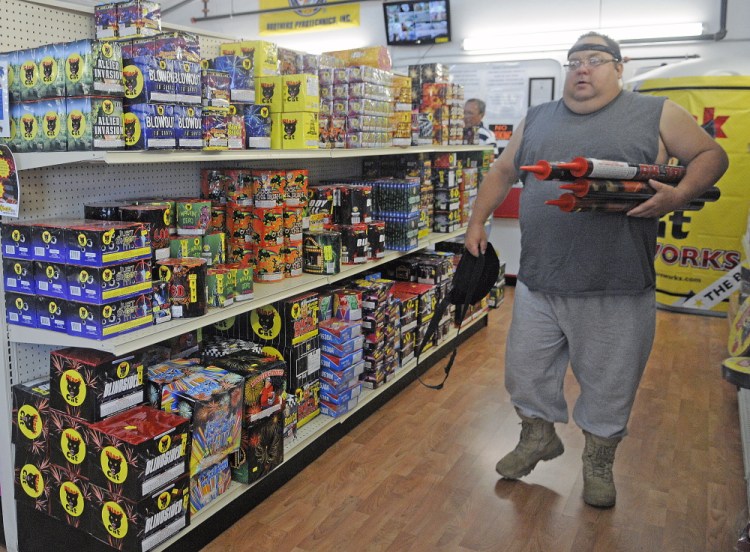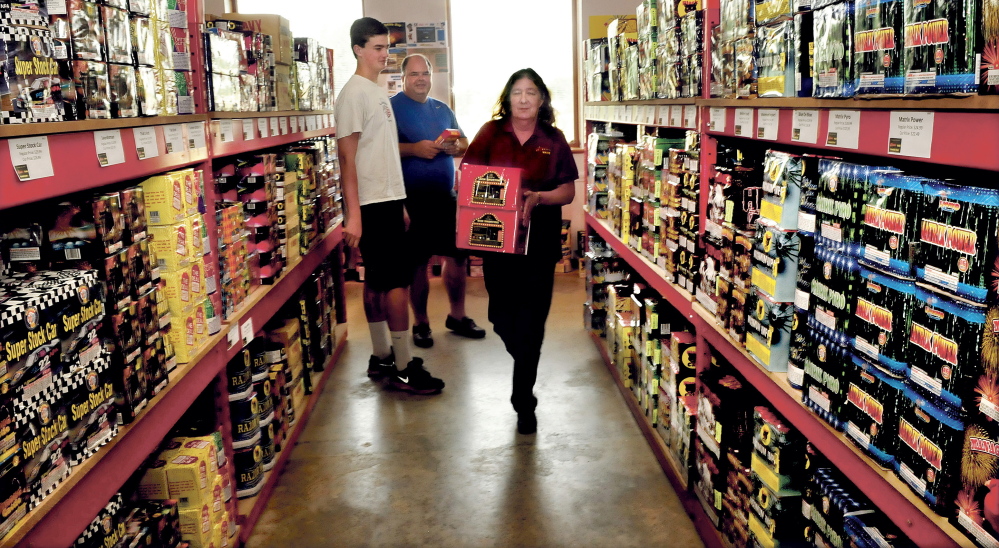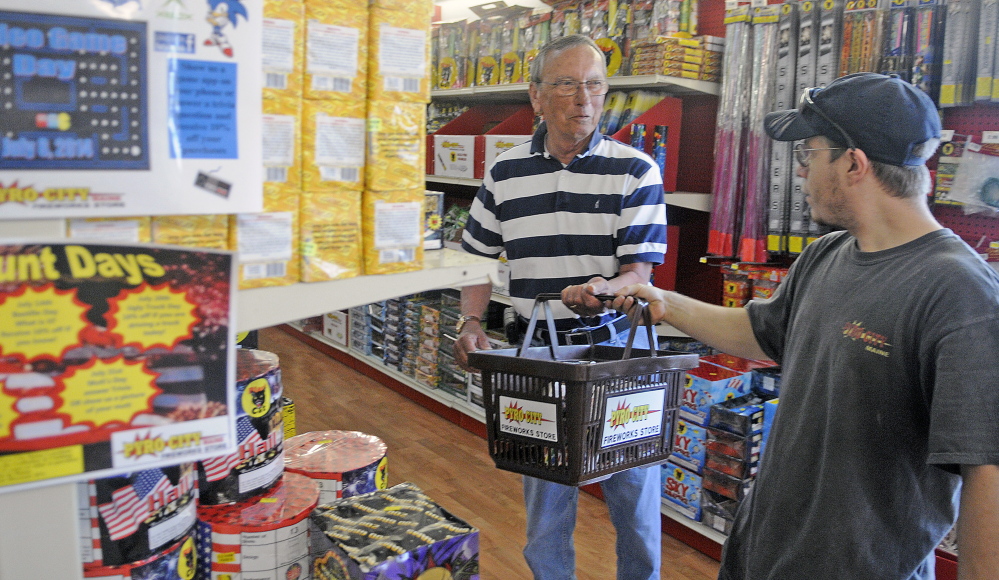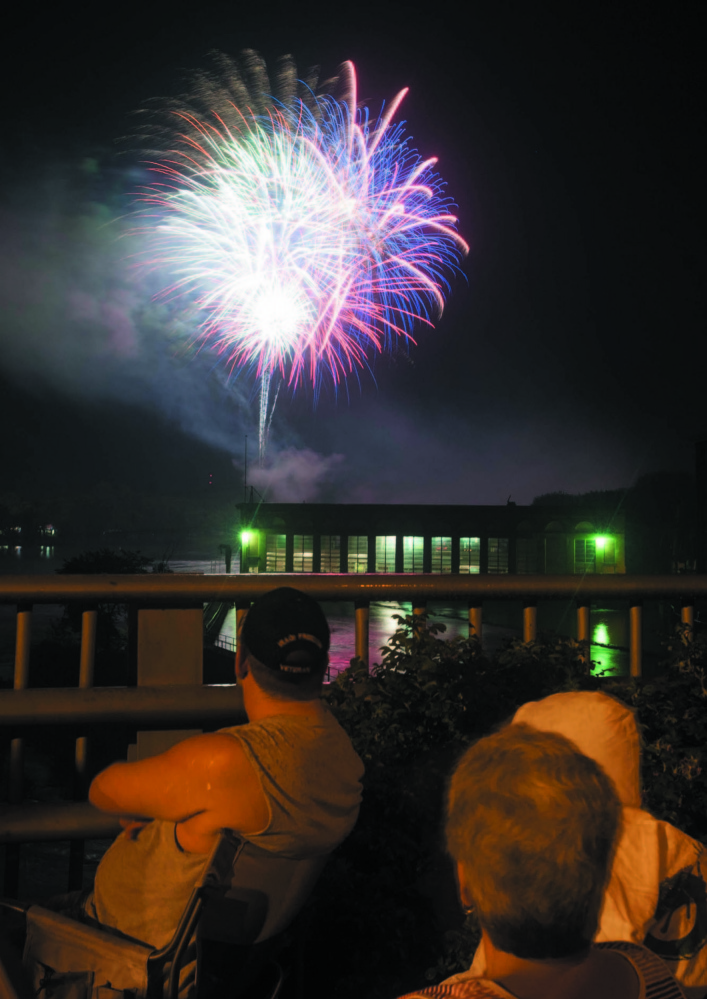Fairfield Town Manager Josh Reny remembers all too well when the ban on fireworks was lifted two years ago.
“One night I went outside and stood in my driveway and there were four or five different families shooting off fireworks,” Reny said.
While the sound of fireworks bursting in air was common after Jan. 1, 2012, when the sale and use of consumer fireworks was no longer banned in Maine, Reny said he has seen a decline since.
Once the ban was lifted, communities were free to adopt their own fireworks ordinances. Many have, and they vary from community to community.
Some towns and cities — particularly Augusta and Waterville — have kept a ban on sale and use.
In October 2012, Fairfield adopted an ordinance prohibiting the use of fireworks in the “urban” area of town, roughly defined by Interstate 95 and the Kennebec River, according to Reny, who lives in that area of town. Fireworks cannot be used on public property, and only on Fourth of July and the two days before and after.
Monmouth enacted a similar ordinance soon after fireworks became legal, according to Fire Chief Dan Roy. The town of about 4,000 is just west on U.S. Route 202 from Manchester’s Pyro City fireworks retail store. The Pyro City chain opened six stores in the state after the ban was lifted, including one in Winslow.
“It’s nothing like it was when it first started,” Roy said.
He said the urge to use pyrotechnics has died down as the novelty has worn off. “When the state changed the law, everyone was shooting off fireworks. It was a new thing, everyone was getting it out of their systems. Over time it calmed down a bit.”
STATE RESTRICTIONS
But even though the state lifted the ban, there are still restrictions.
They can only be set off on one’s own property or with permission of the property owner.
They can only be set off between 9 a.m. and 10 p.m., except Fourth of July, New Years Eve and the weekends following both of those days, when they can be set off until 12:30 a.m.
The state also prohibits purchase and use of fireworks from someone under 21 years old. It prohibits several types of fireworks, including missile-type rockets, aerial spinners and bottle rockets.
State Fire Marshal Joseph Thomas said the restrictions adopted by city and towns and town meetings across Maine fall into several categories.
“Local towns and municipalities are involved in regulation,” Thomas said. “I think you get the sense from public hearings that were held that there are differences as far as what people are interested in seeing and hearing.”
SAFETY ISSUES
Officials in the cities that have outright bans on consumer fireworks — including Augusta, Gardiner and Waterville — say it’s mostly for safety reasons.
Waterville City Manager Mike Roy said the city’s geography played the largest role in the city banning fireworks.
“For our population, we’re an extremely small community land-wise with pretty dense residential areas,” Roy said. “When the ordinance was in discussion, some (who) attended the city council meetings wanted to have their freedom to shoot them off, but those voices were outnumbered by people concerned about proximity and denseness of residential area.”
In two years since Waterville prohibited fireworks, there have been 135 complaints, according to police Deputy Chief Charles Rumsey. Out of those 135 complaints, there were 29 warnings issued, six summons for fireworks use and one arrest for arson stemming from fireworks use.
“There were a ton of complaints” before the Fourth of July 2012 Rumsey said. The complaints have died down since.
In Augusta, safety was the largest concern when a ban on fireworks use was adopted, according to Augusta Fire Department Battalion Chief Jason Farris.
“You have the chance of burn injuries, you can get hit in the eye with them, someone can shoot it and it could land on the roof of an older house,” Farris said. “We have close neighborhoods here.”
Farris said he has responded to several field fires in the past two years that were blamed on the use of fireworks.
Public safety officials say in the first two years of the law allowing fireworks use in Maine, they have received limited information about the number of injuries attributed to fireworks use.
When it allowed fireworks use, the Legislature made reporting of related injuries voluntary, Thomas said. In January, how fire-related injuries are reported was changed to provide a specific category for injuries caused through the use of fireworks.
“The original state statute came through with voluntary reporting of injuries, but that doesn’t bear much fruit,” Thomas said. “We’ve started this year to work with the Maine Emergency Medical Services for weekly reports that track fire-related injuries and it has been designed to now include fireworks as a mechanism of the injury. It’s the first time we can track specific injuries associated with fireworks.”
IT’S ALL RELATIVE
Some towns, such as Monmouth, adopted ordinances prohibiting use of fireworks throughout most of the year, allowing their use only around celebratory holidays such as July Fourth, New Year’s Eve, Memorial Day and Labor Day.
Other towns, including Winslow and Belgrade, haven’t adopted an ordinance and follow state rules. Winslow, however, does have an ordinance for the sale of fireworks in town.
Keeping track of what each town allows can be complicated for those visiting or traveling to other areas, which is one of the reasons that Pyro City in Winslow has a list of each town’s ordinance on the wall near the register. Each customer that comes in speaks with an employee to discuss what they’re looking for, the legality of it and safety measures, according to manager Vern Carlow.
“We talk with customers about what the product does, if it fits their situation,” Carlow said Wednesday afternoon. “You ask the customer how big their lot is. Someone living in town with a half-acre lot, you don’t want them using the big stuff. We preach safety.”
Carlow described this week as the store’s Christmas, as business is booming for those looking to celebrate the country’s independence. Celebrating with fireworks can be costly, however, as Carlow said customers spend anywhere from $25 to $3,000.
“It’s really depending on what they want to do,” Carlow said. When asked what $3,000 could buy, Carlow was blunt.
“A lot,” he said.
Between the cost and the novelty of fireworks perhaps wearing off, central Maine towns and cities aren’t as inundated with complaints as they were two years ago.
“They were being used a lot more frequently in the early part of this than they are now,” Reny said about Fairfield fireworks. “I live in the central part of town and from my perspective, there have not been any issues in my neighborhood in the past year. People went out, spent a bunch of money when it was first legal, got their kick, and I think that was it. It’s more of a special occasion.”
Jesse Scardina — 861-9239
Twitter: @jessescardina
Send questions/comments to the editors.






Comments are no longer available on this story